When CLS Russian students, Raven and Valentina, first learned they’d be studying in Bishkek, Kyrgyzstan, they were ecstatic. Their second feeling was one of uncertainty – what were they going to eat!? As a vegetarian and vegan respectively, Raven and Valentina’s plant-based diets were in strong contrast to the meat and dairy-heavy diet traditionally found in Central Asian countries like Kyrgyzstan. After all, Kyrgyzstan's national dish is Beshbarmack, a horsemeat stew that can be traced back to the country’s century-old nomadic roots.
However, over the course of their program, Raven and Valentina have been pleasantly surprised by the variety of options available them, thanks in large part to their accommodating host families but also the multi-culturalism and prevalence of cuisines from around the world that can be found in Bishkek. While on a site visit to Bishkek last summer, CLS Senior Communications Officer Rori DiFiore had the pleasure to speak with Valentina and Raven about their experiences navigating veganism/vegetarianism during their program.
Rori: As part of your CLS experiences, you were both placed with host families. What has it been like navigating being vegetarian/vegan in the host family environment?
Raven: I found my family well prepared. When I first settled into my host family, one of the first things that they asked me was, what can you not eat? Do you eat fish? Can you eat chicken? Do you like milk? Are you fine with eggs? Those questions told me they were prepared, and these are important things to ask a vegetarian student. They’ve been accommodating all along the way, and I really appreciated that they checked in first thing with me.
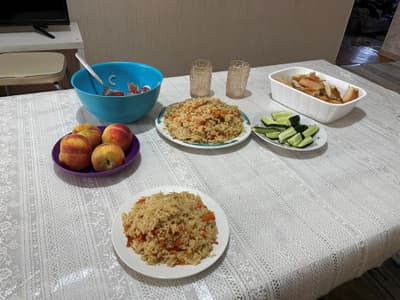
Rori: Did you have that conversation with them entirely in Russian?
Raven: Yes, it was all in Russian! I’d say it’s important to have that vocabulary going into the experience. That’s something I did beforehand, I made sure I knew all the words. I could say fish (рыба), chicken (курица), egg (яйцо), milk (молоко) in Russian.
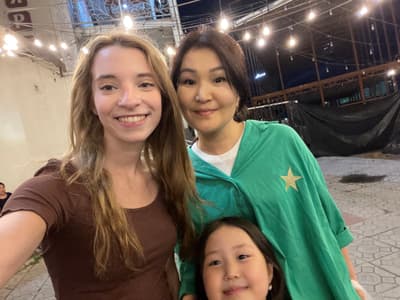
Rori: That’s excellent advice because vegetarianism might not be as well known in other countries but if you have that vocabulary, you can navigate it. How was that experience for you, Valentina?
Valentina: My host family has also been really knowledgeable. When I got here, they confirmed with me that they knew I was vegan. I really appreciate that they knew I had dietary restrictions before the program began. I was worried that when I would get here, they would have dinner prepared and I would not be able to eat it and I didn’t want to be rude. I was so glad that didn’t end up being the case. Also, like Raven said, I’d recommend being prepared and having the vocabulary written down for the foods that you cannot eat.
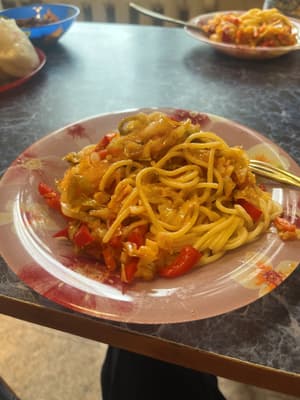
Rori: That's really helpful advice for vegetarians or others with dietary restrictions across sites. Now on to a fun question, what have been some of your favorite vegetarian dishes you’ve had in your host stays or any foods you are eating regularly here?
Raven: I’ve been eating a lot of [manti] ravioli or dumplings that are filled with potatoes. And typically, it's eaten with sour cream. It’s something common to get at restaurants and my host family also prepares them for me.
Valentina: For me, it’s been lentil soup, I’ve eaten a lot of mushrooms and green beans too. There’s a ton of mushrooms here and I think they forage for them.
Raven: I feel like I have constant sources of food both through American University of Central Asia (AUCA) and through my host family. Valentina: Yes, the cafeteria here at AUCA always has a ton of vegetarian options too.
Rori: I had a chance to experience the cafeteria—it's delicious! Tons of healthy fruit and vegetable options too. Have you had experiences here in Bishkek that challenged the conception that Kyrgyzstan has a meat-heavy cuisine?
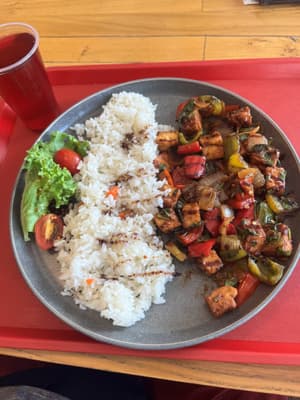
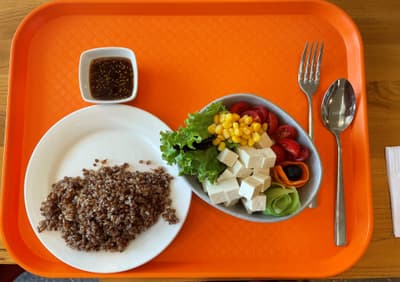
Raven: Bishkek is a very cosmopolitan city. There's a lot in terms of the food that you can find here. And while Kyrgyzstan as a whole may be heavy on meat, it’s important to keep in mind there are a lot of different cultures, especially in a big city like Bishkek. There’s a prevalence of Thai, Chinese, and Indian food here in Bishkek, which have vegetarian dishes at the heart of their cuisines.
Rori: I’ve seen a plethora of amazing looking fresh fruits and vegetables in Kyrgyzstan. What’s one of your personal favorites?
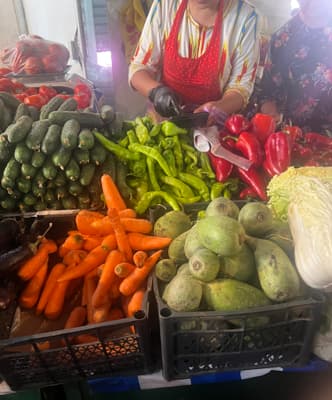
Valentina & Raven: Cherries!
Valentina: Summer is the time for vegetables and there are tons of vegetables and fruits. My family has baskets and baskets full of fruits.
Rori: What final thoughts or words of advice would you give to fellow vegetarians and vegans about to embark on their CLS experience?
Valentina: To all my fellow vegans going on the CLS Program, firstly, congratulations on being selected for this great opportunity! CLS is a very accommodating program, and you can definitely be vegan and go abroad with them! My first tip for you is to communicate clearly what you can and can’t eat to your host family and language partner, maybe have it written down in your target language so you can remember! My second tip is to rely on the CLS staff to help you. They are there to make sure you succeed, so don’t hesitate to talk to them about vegan options while on the program. Surprisingly, the vegan food I ate in Kyrgyzstan was some of the best food I’ve ever had! So don’t worry, have fun, and learn your target language! I wish you success in your journey.
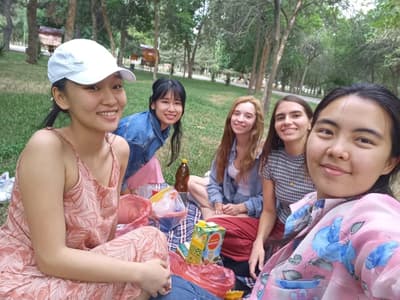
Raven: When it comes to one last piece of advice for other vegetarians and vegans in Kyrgyzstan, I would advise them to know that you can and will succeed in living in Kyrgyzstan — not in spite of, but because of your plant based diet. Being vegetarian or vegan abroad opens you up to new experiences, vocabulary, and dishes you may never have encountered otherwise! Instead of viewing your diet as a restriction, view it as an opportunity to grow both your language skills and as a person through the unique experiences you’ll have.


